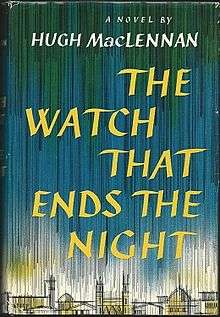The Watch That Ends the Night
 First edition | |
| Author | Hugh MacLennan |
|---|---|
| Country | Canada |
| Language | English |
| Genre | Historical |
| Publisher | Macmillan of Canada, New Canadian Library |
Publication date | 1958 |
| Pages | 372 |
| ISBN | 978-0773524965 |
The Watch That Ends the Night is a novel by Canadian author and academic Hugh MacLennan. The title refers to a line in Our God, Our Help in Ages Past, a hymn by Isaac Watts. It was first published in 1958 by Macmillan of Canada.
Plot summary
George and Catherine Stewart share not only the burden of Catherine's heart disease, which could cause her death at any time, but the memory of Jerome Martell, her first husband and George's closest friend. Martell, a brilliant doctor passionately concerned with social justice, is presumed to have died in a Nazi prison camp. His sudden return to Montreal precipitates the central crisis of the novel. Hugh MacLennan takes the reader into the lives of his three characters and back into the world of Montreal in the thirties, when politics could send an idealist across the world to Spain, France, Auschwitz, Russia, and China before his return home.
Title
The title is a reference to a line in Isaac Watts' Our God, Our Help in Ages Past:
A thousand ages in Thy sight
Are like an evening gone;
Short as the watch that ends the night
Before the rising sun.
This echoes the theme of mortality that is central to the plot of the novel. The hymn and the psalm as a whole contrast the brevity and struggle of human life with the eternity of God (and, in Christian interpretation, of life everlasting after death).
Reception
The novel earned MacLennan the Canadian Governor General's Award for literature. A passage from the book was adapted for use in the song "Courage (for Hugh MacLennan)" by Canadian rock band The Tragically Hip.
A number of elements from the novel are believed to reflect MacLennan's life. Catherine Stewart is believed to have been inspired by MacLennan's first wife, Dorothy Duncan, who was dying of the same ailment Catherine suffers from while MacLennan was writing the novel. Another major character, Jerome Martell, is generally thought to have been inspired by Norman Bethune, a claim the author denied. MacLennan's biographer, Elspeth Cameron, points to F. R. Scott and Samuel MacLennan, the author's father, as models for Martell. However, Mr. MacLennan, in a 1965 newspaper article referring to his neurologist, Dr. Reuben Rabinovitch of Montreal wrote: “When my novel, ‘The Watch That Ends The Night,’ appeared, it was widely believed that its doctor-protagonist, Dr. Jerome Martell, was modeled on the famous Dr. Norman Bethune. He wasn’t, for I never knew Bethune. But Martell’s way of dealing with his patients was Dr. Rab’s way. This is not to suggest that Martell was modeled off him; he wasn’t. But if I had not known Dr. Rab, I could never have understood Dr. Martell.” Dr. Martell's life history was also notably quite similar to that of Dr. Rabinovitch.
References
- Brian Busby, Character Parts: Who's Really Who in Canlit, Toronto: Knopf, 2003. p. 163-164, 171, 245. ISBN 0-676-97579-8.
- Hugh MacLennan, noted Canadian author, pays tribute to the late Dr. Rabinovitch, in Canadian Jewish Review, October 22, 1965. Citing a Letter To The Editor in the Montreal Star newspaper.
| Awards | ||
|---|---|---|
| Preceded by Execution |
Governor General's Award for English language fiction recipient 1959 |
Succeeded by The Luck of Ginger Coffey |